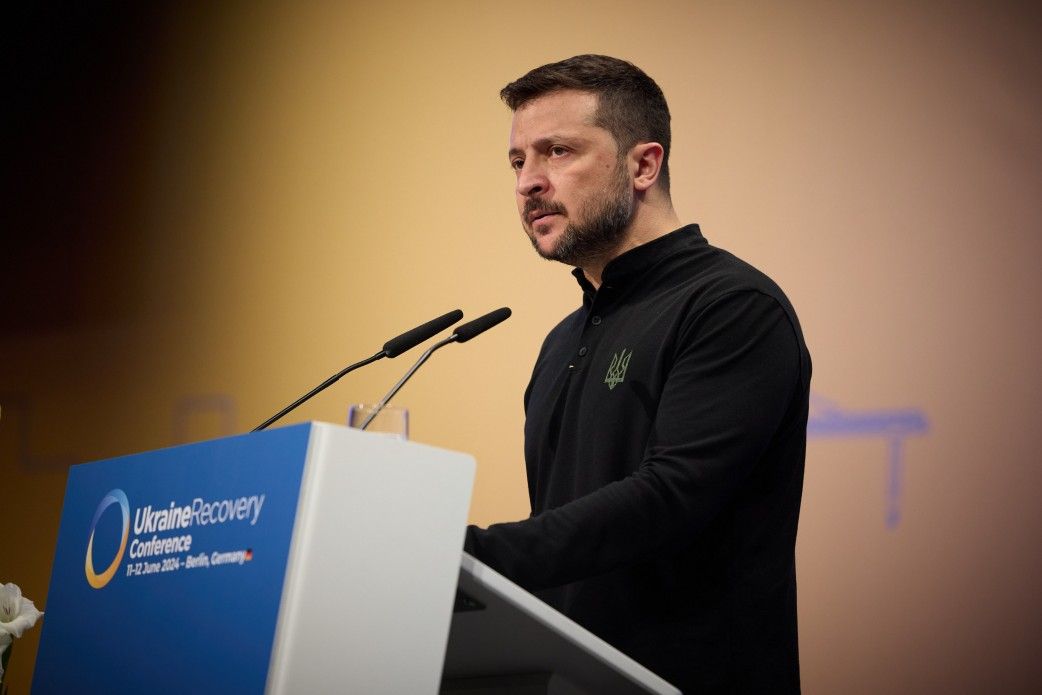Ukraine Business Roundup — Dispatch from Ukraine Recovery Conference in Berlin

The following is the June 12, 2024 edition of our Ukraine Business Roundup weekly newsletter. To get the biggest news in business and tech from Ukraine directly in your inbox, subscribe here.
Ukraine’s annual recovery conference happened this week in Berlin, but instead of talks of grand plans to rebuild the country, two dark clouds hung over the entire event.
The first is Ukraine’s dire need for air defense as Russian attacks continue to devastate the country’s energy system and infrastructure.
President Volodymyr Zelensky confirmed that Russian attacks have destroyed half of Ukraine’s energy system. Peak energy consumption last winter was 18 gigawatts (GW), but Russia had destroyed 9 GW, he said.
The president appealed for investment that would restore 1 GW over the next three to four months. At the conference, governments and financial institutions announced large amounts of aid to repair Ukraine’s energy infrastructure, a welcome sign.
But as Energy Minister Herman Halushenko said while thanking international partners, it’s “still not enough” to make all the repairs Ukraine needs.
Here’s the thing — no amount of money to repair energy infrastructure will matter if Ukraine doesn’t have the air defense munition to protect that infrastructure. Billions will be spent in vain.
DTEK’s executive director told me this week that every single one of its thermal power stations that it has repaired over more than two years after Russian attacks have been repeatedly targeted.
He said that at times 10 missiles can target a plant while a nearby air defense system has somewhere between two to three missiles in it.
Yes, Germany announced further air defense support for Kyiv at the conference yesterday, and the New York Times reported the U.S. will be sending another Patriot battery but the country needs more.
It’s bewildering that countries don’t see that if they got Ukraine the air defense it needs, they wouldn’t need to shore up the millions and billions to repair damaged energy infrastructure.
If they are serious about helping Ukraine and fostering development and investment in the country, their priority has to be making Ukraine a safe place to live, and do business in.
The other dark cloud hanging over the conference was the fact that just a day before, the country’s top recovery official, Mustafa Nayyem resigned, saying his work had been undermined by the government.
A recovery conference without a recovery chief? Indeed, it was a strange signal to the world, especially after Infrastructure Minister Oleksandr Kubrakov was fired in early May, and quite frankly, a bad look for Ukraine.
It put Ukraine’s political infighting and discussion in the headlines just as the conference was getting underway.
Additionally, it has Western partners worried about the reliabilty and predictability of the Zelensky administration at a critical time, the Financial Times reported, citing Ukrainian and Western officials.
“This situation is really bad for the perception of the Ukrainian government and Ukraine generally. Ukraine is and has to be perceived as unbroken,” Hlib Vyshlinsky, executive director at the Kyiv-based Center for Economic Strategy told the Financial Times.
Firing Kubrakov and Nayyem’s departure “build an image of weak and unpredictable governance that is unjust to efforts of Ukrainians during these years,” Vyshlinsky said.

Worst-case scenario
Ukrainians could face up to 20 hours of blackouts a day under a “worst-case” scenario if the country cannot repair and properly defend its energy infrastructure from Russian attacks, Executive Director of Ukraine’s largest privately-owned energy company DTEK Dmytro Sakharuk told the Kyiv Independent in an interview on June 9.
The company has assessed various scenarios, with the worst being based on a continuation of the status quo — a dearth of air defenses to protect critical infrastructure and the financing to make repairs.
Even if the country makes repairs, without missiles for air defense systems, Russia can easily keep targeting the energy system as it wants.
Under what it considers the worst-case scenario, DTEK itself would continue to run with around 10% of pre-war levels of thermal power generation, and deficits would be around 2-4 gigawatts (GW) a day. The deficit across the whole system will be around 25%, undoubtedly leading to long blackouts.
In this scenario, large plants could start feeling the absence of electricity in November, defense enterprises could feel the squeeze in December, and crucial infrastructure like water and sewage systems in January 2025, the company has assessed.
“This is very close to realistic right now. Regarding what will happen this winter, we are heading very quickly to this (scenario),” Sakharuk said.
Read the full article here.

Western weapon production comes to Ukraine
The German arms company Rheinmetall and the Ukrainian government agreed on the sidelines of the Ukraine Recovery Conference in Berlin to begin production of the modern Lynx armored vehicles in Ukraine this year, officials confirmed for the media on June 12.
"The first such vehicle will be produced in Ukraine by the end of the year," Strategic Industries Minister Alexander Kamyshin told Ukrinform in Berlin.
The news comes shortly after Rheinmetall opened its first plant in Ukraine. The factory will repair and later also produce armored vehicles jointly with the Ukrainian state-owned enterprise Ukroboronprom.
Its opening is part of Kyiv's efforts to localize arms production and develop a more independent arms industry.
Last December, Rheinmetall announced its plans to start producing Fuchs armored personnel carriers in Ukraine by late summer of 2024 and Lynx vehicles by late 2024, or "12 to 13 months" after signing the contract.
Rheinmetall's Lynx was first presented in 2016. It has a modular design, meaning it can be equipped with different armaments and function as an infantry fighting vehicle, an anti-aircraft platform with a 30-35 mm weapon, or even to operate a 120 mm cannon of the Leopard tank.

Capacity building
Ukraine and Germany's finance ministries signed a joint Declaration of Intent to bolster bilateral cooperation in business that will support Ukraine’s reconstruction post-war.
"We are not limiting ourselves to the form of support that Ukraine needs to win the war. We want to contribute now so that Ukraine can set the course for future growth through its reconstruction," German Finance Minister Christian Lindner said at the recovery conference.
The support isn’t just about financial resources but building institutional capacity to support Ukraine's private companies and facilitate investment, the German minister said.
Germany’s finance ministry has instructed the KfW Development Bank to assess the feasibility of a project that would focus on the institutional capacity of Ukraine’s Finance Ministry, particularly on internal procedures and systems for strategic analysis and information management.
The project will also support the Business Development Fund, to help it as an independent institution focused on Ukrainian small and medium-sized businesses.
But for now, the declaration is just a sign of intent, not a binding treaty. The underlying agreements of the declaration will be signed later this year.

Raking it in
Ukraine’s banks are flush with cash, Dominic Culverwell writes in his latest article on Ukraine’s banking sector.
Why are they doing so well? An influx of foreign aid, high interest rates on government bonds, pay rises for soldiers, and central bank policies after the start of the full-scale invasion boosted the sector's profits to 40.5 billion hryvnia ($1 billion) in the first three months of 2024, 19% higher than the same period last year.
The banking sector turned its fortunes around after hemorrhaging money in the first few months of Russia’s full-scale invasion.
As the war dragged into 2023, it became clear that war-time monetary policies were benefiting Ukrainian banks. Profits surpassed pre-war levels to 83.2 billion hryvnia ($2 billion) by the end of the year.
It's yet unclear whether or not the benefits of the profits are trickling down to Ukrainian citizens. Despite banks’ large liquidity, corporate lending is low and the majority are state-owned causing money to circulate around various government institutions.
Read the full article here.
What else happened at the recovery conference
Italy prepares $150 million aid package to support Ukraine's infrastructure
The funds will be allocated for Ukraine's "infrastructure, railways, healthcare, agriculture, and mine clearance," and 45 million euros ($48 million) of that will be used for the reconstruction of Odesa, Italian Foreign Minister Antonio Tajani said on June 11 at the Ukraine Recovery Conference in Berlin.
Von der Leyen: Ukraine to receive 3.4 billion euros from EU this summer
Ukraine will receive 1.5 billion euros ($1.6 billion) in Russian frozen assets revenue in July and 1.9 billion euros ($2 billion) under the Ukraine Facility already this month, European Commission President Ursula von der Leyen said on June 11.
EBRD to provide 1 billion euros for Ukraine's battered energy infrastructure
"Efforts will now be focused on distributed energy capacities, not just on generating capacities, as was the case last year," EBRD President Odile Renaud-Basso said on June 11 at the Ukraine Recovery Conference in Berlin.
U.S. providing $824 million to support Ukraine’s energy infrastructure
U.S. Special Representative for Economic Recovery in Ukraine Penny Pritzker said in Berlin that given the dire energy situation, the U.S. is providing $824 million to support Ukraine's energy infrastructure.
Politico: European banks to provide over 600 million euros in recovery funds for Ukraine
Kyiv is set to receive hundreds of millions of euros from European banks following a series of agreements signed in Berlin, Politico reported. The funds will go to helping Ukraine’s economy now during the war as well as go towards rebuilding the country after the war.












